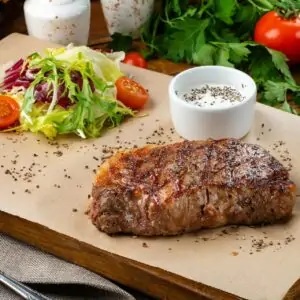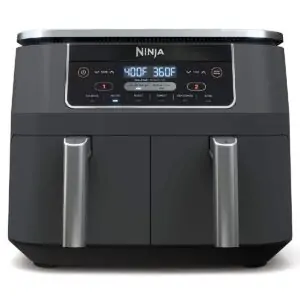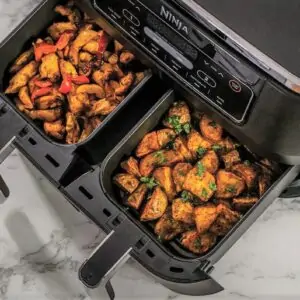The great debate: air frying vs traditional frying.
Both methods claim to deliver that much sought-after crispy, golden texture, but how do they truly compare? Let’s dive into the key differences between air frying and traditional deep frying, exploring their mechanics, taste, health implications, and more. By the end of this blog post, you’ll better understand which method suits your needs and preferences best.
JUMP TO:
- Key Takeaways
- Air Frying vs Traditional Frying: Comparison Table
- Understanding Air Frying
- Check Out Our Air Fryer Reviews…
- Understanding Traditional Deep Frying
- Taste Comparison: Air Fried vs Deep Fried
- Time Efficiency: Cooking Speeds And Preparation
- Health Implications: Oil Usage And Nutritional Value
- Cost Analysis: Appliances And Oil Expenses
- Cleaning And Maintenance
- Versatility: Cooking Methods And Recipe Options
- Air Frying vs Traditional Frying: Summary
- Frequently Asked Questions
Key Takeaways
- Air frying is a way healthier alternative to deep frying, still providing crunch with minimal oil.
- Deep-fat fryers are specialised appliances that cook food in hot oil and create a crispy exterior.
- Air fryers require less cleaning and offer more cooking methods than deep fryers, making them practical for everyday use.
Air Frying vs Traditional Frying: Comparison Table
Air Frying | Traditional Frying | |
|---|---|---|
Cooking Method | Uses hot air circulation | Immerses food in hot oil |
Cooking Time | Generally shorter | Can be longer for deep frying |
Oil Usage | Requires significantly less oil | Requires a considerable amount of oil |
Health Benefits | Healthier due to reduced oil usage | Higher oil content can lead to more calories and fat |
Texture and Taste | Produces a crispy texture | Provides a traditional deep-fried texture |
Cooking Capacity | Limited capacity for larger items | Suitable for larger batches |
Cooking Equipment | Requires and air fryer appliance | Uses a standard stovetop or deep fryer |
Preheating | Typically requires preheating | No preheating necessary |
Cleanup | Easy cleanup with non-stick surfaces | Greasy and often messy cleanup |
Versatility | Can bake, roast and grill in addition to frying | Primarily used for frying |
Food Moisture Retention | Retains food moisture | May cause food to be drier |
Temperature Control | Precise temperature control | Control varies with stovetop heat |
Cost | Initial purchase cost for the air fryer | Generally lower initial cost |
Safety | Safer with no hot oil to handle | Risk of hot oil splatter and burn |
Environmental Impact | More energy-efficient | Higher oil usage contribute to waste |
Understanding Air Frying

Air frying employs hot air circulation to cook air-fried food, serving as a healthier substitute for deep frying. This method requires minimal oil, making it a healthier choice for those who still crave the satisfying crunch of fried foods.
Despite taking longer and potentially not yielding the same crispiness as deep frying, air frying has become popular for its flavour blend and health benefits.
Air Fryer Mechanics
An air fryer operates by circulating hot air around the food, enabling it to be cooked with minimal oil, which is a key difference when comparing air fry vs traditional frying methods. The Maillard reaction, a chemical process responsible for the delicious browning effect and flavour of fried foods, still occurs in air frying, albeit to a lesser extent than deep frying.
One key point to remember when using an air fryer is to avoid overloading the basket to prevent uneven cooking. Having a single layer of food in the basket or tray is suggested for even cooking.
Best Foods For Air Frying
Air frying is highly recommended for air-fried foods such as:
- Vegetables
- Chicken
- Fish
- French fries
- Salmon
- Tofu
- Burgers
- Bacon
- Brussels Sprouts
- Bananas
While it is possible to fry battered food in an air fryer, a wet batter made with eggs, milk, and flour should not be used. Instead, the outside of the batter should be made of something dry, such as breadcrumbs, to prevent sticking.
Check Out Our Air Fryer Reviews…
Ninja Dual Zone
Salter EK4548 Dual
Tefal
Tower
Understanding Traditional Deep Frying
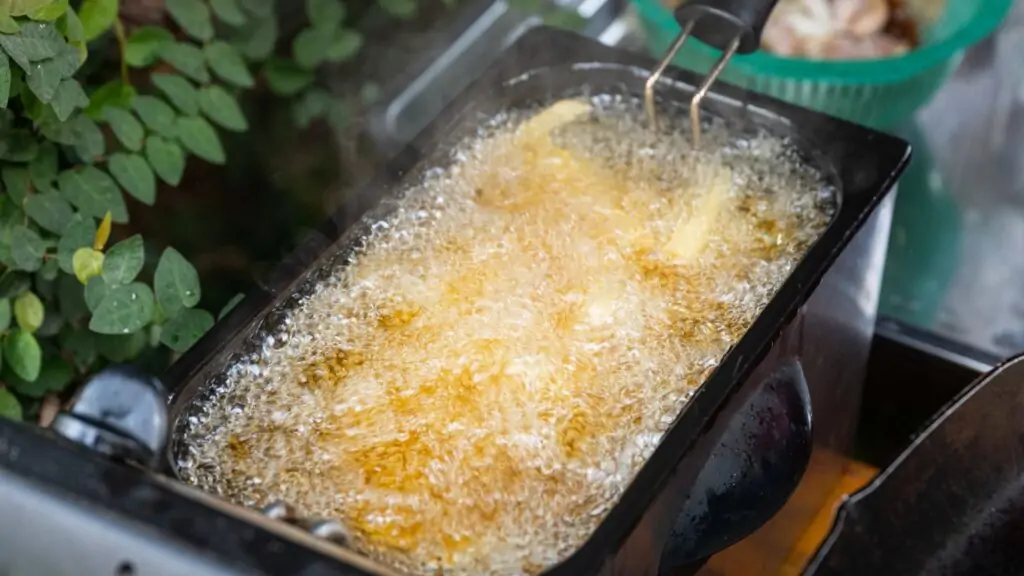
Deep frying is a cooking technique that involves:
- Submerging food in hot oil or fat at high temperatures
- Producing a browned and crispy texture
- Speedy cooking while keeping the centre tender and juicy
- A popular method for preparing indulgent fried foods
Nonetheless, deep frying involves extra potential risks and necessitates more sophisticated cooking techniques than air frying.
Deep Fryer Mechanics
A deep fryer is a separate appliance designed exclusively for deep frying food. The food is submerged in hot oil, and a batter, typically composed of eggs, milk, and flour or breadcrumbs, covers the food before frying. Deep fryers are not suitable for baking or roasting. Maintaining the appropriate temperature of the oil is vital to achieving a crispy crust that minimises oil absorption.
After you cook food, placing it on a paper towel helps absorb any surplus oil and enhances its crispiness.
Best Foods For Deep Frying
Deep frying is an ideal cooking method for:
- Battered fish
- Battered vegetables
- Potato chips
- Fried chicken
These deep-fried food items are particularly well-suited for deep frying, as the high temperatures and submersion in oil create a deliciously crispy exterior and tender interior.
Not all foods are suitable for deep frying, and healthier options, such as air frying, might be more fitting depending on the desired results and nutritional factors.
Taste Comparison: Air Fried vs Deep Fried
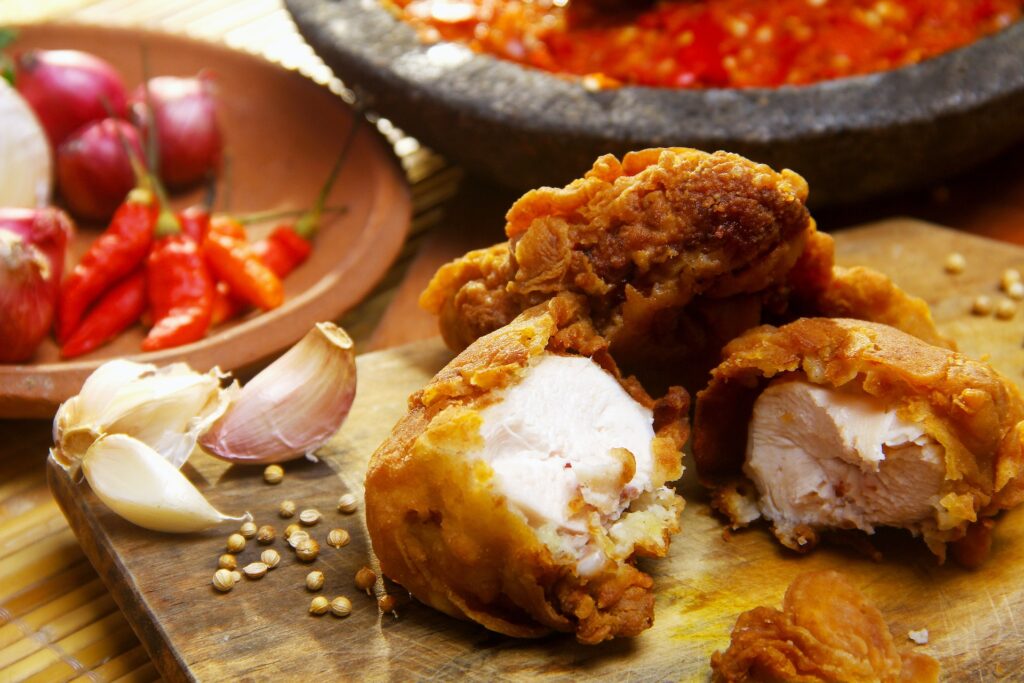
Air frying can produce a similar crispiness to deep frying but without oil. While the taste and texture may differ, it can still be a pleasant experience. Incorporating seasonings before cooking allows the food to absorb the flavour more effectively.
On the other hand, deep frying, a cooking process, generally yields more desirable flavour compounds due to the Maillard reaction. The Maillard reaction is a chemical process that takes place when an amino acid and a reducing sugar are heated together, resulting in changes in the colour and flavour of foods.
Time Efficiency: Cooking Speeds And Preparation
Regarding cooking time and preparation, air frying typically takes less time. It is less labor-intensive than deep frying, presenting a more convenient option in the air fry vs traditional frying debate. An air fryer requires only a short time to preheat- just 5 minutes! On the other hand, a deep fryer may need around 10 to 20 minutes or even longer to get ready.
Health Implications: Oil Usage And Nutritional Value
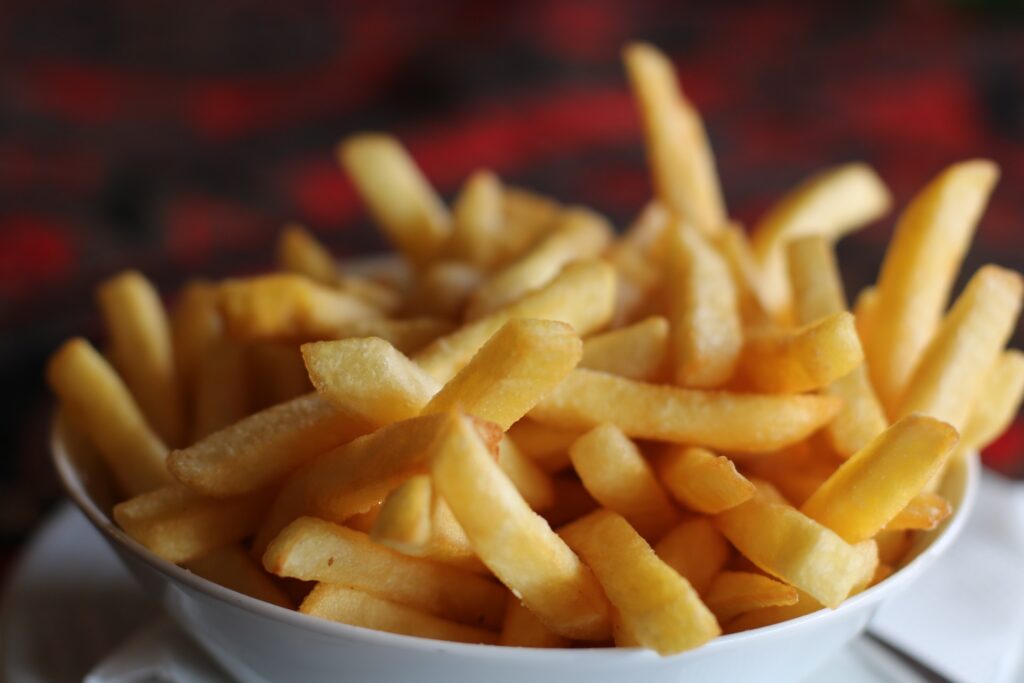
With minimal to zero oil usage, air frying poses a healthier alternative than deep frying, which requires submerging food in hot oil. When comparing the two methods, it is important to consider calorie intake and nutritional value.
Air frying has been demonstrated to reduce calorie intake and minimise exposure to unhealthy fats, which have been linked to various diseases such as heart disease, diabetes, and cancer, making it a healthier choice when comparing air fryer vs deep frying.
Conversely, deep-fried foods usually have higher fat content than foods prepared with other cooking methods.
Cost Analysis: Appliances And Oil Expenses
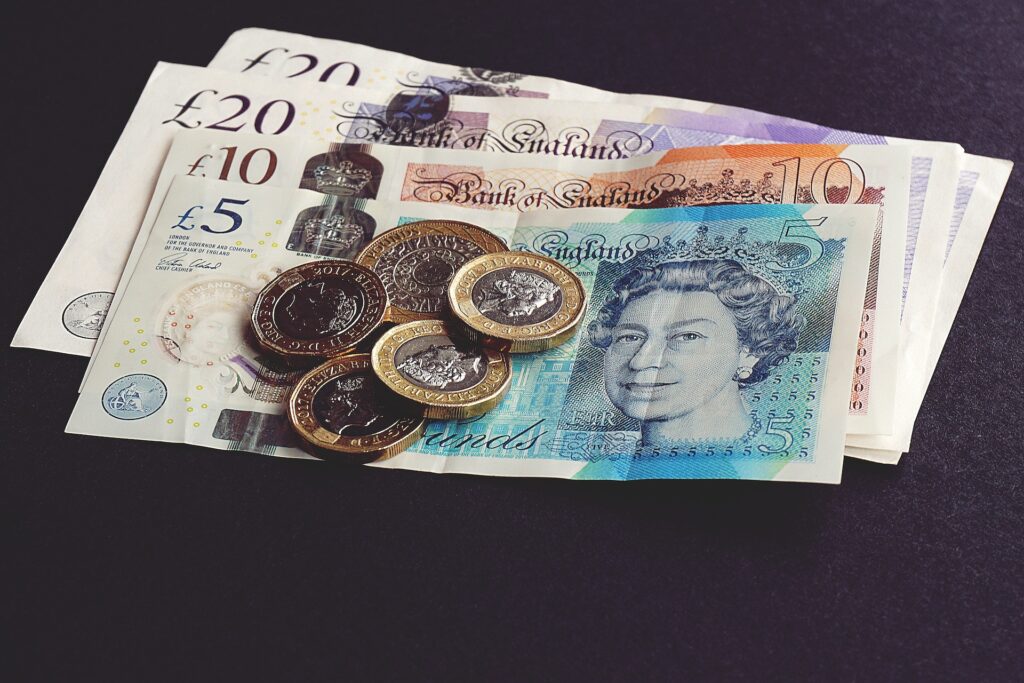
Considering the cost analysis between air fryers and deep fryers, it is important to take into account the initial cost of the appliance, the ongoing cost of oil expenses, and the long-term maintenance costs.
Air fryers tend to be pricier than deep fryers. However, the frequency of oil changes required for deep fryers constitutes a recurring cost of oil expenses, which should also be factored into the overall cost analysis.
Cleaning And Maintenance

Air fryers have several advantages over deep fryers:
- They require less oil and have fewer detachable parts, making them easier to clean and maintain.
- They are more convenient to store and discard surplus oil, as they use far less oil than deep fryers.
- They are a more practical choice when comparing air fryers vs deep frying.
In contrast, deep fryers demand more rigorous cleaning and maintenance, including oil filtering and changing, to guarantee longevity and proper functioning.
Versatility: Cooking Methods And Recipe Options
Offering more flexibility, air fryers become preferable for those seeking varied cooking options in the air fryer vs deep frying comparison. An air fryer can be used to:
- Fry
- Roast
- Reheat
- Steam
- Bake food
This versatility allows a wide range of recipes, such as appetizers, main dishes, side dishes, and desserts, to be prepared using an air fryer.
Conversely, deep fryers are designed exclusively for deep frying food and are unsuitable for baking or roasting.
Air Frying vs Traditional Frying: Summary
In conclusion, both air frying and deep frying have pros and cons, with air frying offering a healthier, more versatile, and cost-effective option. In contrast, deep frying delivers a more traditional taste and texture. Ultimately, the choice between air frying and deep frying comes down to personal preferences, dietary considerations, and cooking needs. By understanding the key differences between these two methods, you can make an informed decision and enjoy the delicious world of fried foods in a way that suits you best.
Frequently Asked Questions
Is Air Frying Better Than Regular Frying?
Air frying is a healthier alternative to deep-frying since it uses significantly less oil and produces less fat and calories. It also reduces the amount of potentially harmful compounds in food and may promote weight loss compared to deep-fried foods. Air fryers have proven to be effective in cutting down on unhealthy oils and calories, making them a beneficial cooking method.
What Is The Disadvantage Of An Air Fryer?
Air fryers offer the taste of deep-fried food without the unhealthy side effects, but they have downsides like being bulky, hard to clean, and having limited cooking capacity. However, air fryers are still a great option for those looking for a healthier alternative to deep-fried food. They are easy to use, require minimal oil, and can cook a variety of foods. Plus, they are much more affordable than traditional deep fryers
Can Air Fryer Replace Frying?
Air frying can be a healthier alternative to deep-fried foods, as it uses significantly less oil than deep fryers. However, for wet batters like churros, you will still need a deep fat fryer. Having tested air fryers on various types of foods, the results can be satisfactory and may replace your need to deep fry.
What Foods Are Best Suited For Deep Frying?
Deep frying is ideal for battered items, potato chips, and fried chicken.
How Long Does It Take To Preheat An Air Fryer Compared To A Deep Fryer?
An air fryer preheats in just 5 minutes, while a deep fryer can take 10 to 20 minutes or more.

